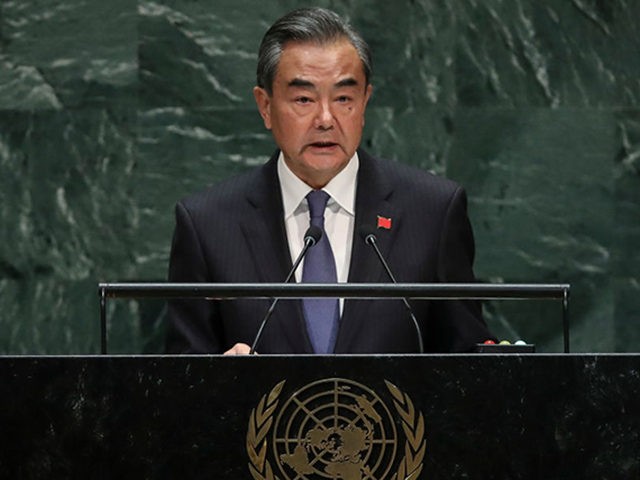Chinese Foreign Minister Wang Yi told the board of the U.S.-China Business Council on Monday that his country looks forward to a “reset” in relations with the United States under a Joe Biden administration.
The South China Morning Post (SCMP) quoted Wang using the coronavirus pandemic as a reason for Washington to seek better relations with Beijing:
Wang’s remarks, made during a video dialogue with the board of the US-China Business Council, included various suggestions for improving the two countries’ tumultuous ties, including strengthening communication at all levels and expanding areas of cooperation — including getting the coronavirus pandemic under control.
“The most urgent task currently is for the two sides to work together to remove all sorts of barriers to achieve a smooth transition in China-US relations,” he said, according to a brief on the Chinese foreign ministry’s website.
“At the same time, based on the direction of mutual benefits for our two peoples and countries, we need to strive to restart dialogue, return to the right track, and rebuild trust in this next phase of relations.”
CNBC reported Wang had some suggestions for how the United States could “change its approach” to improve relations, such as reducing its “interference” in what Beijing regards as its internal affairs. This is generally code for China telling the rest of the world to stop complaining about its human rights abuses in places like Tibet, Hong Kong, and Xinjiang province.
“The U.S. should also abide by the norms of international relations, not frequently intervene in China’s internal affairs, and not hinder Chinese people’s right to pursue a better life,” Wang said, after instructing American leaders to stop viewing China as an adversary.
CNBC reported that Wang’s audience included American chief executives Mary Barra of General Motors, Jim Umpleby of Caterpillar, Ryan McInerney of Visa, Rajesh Subramaniam of FedEx, and Steve Mollenkopf of Qualcomm.
“China’s top leadership continues to support engagement with business leaders from American industry during a year of heightened tensions. This sends a necessary, positive signal to Chinese industry that, despite tensions, it’s okay for U.S. and Chinese companies to do business together,” Matt Margulies of the U.S.-China Business Council said of the videoconference with Wang.
As CNBC pointed out, former Vice President Joe Biden has not yet committed to lifting the punitive trade measures President Donald Trump imposed on China, and the Trump administration continues to impose more of them.
Biden has discussed the need to “get tough with China” and “build a united front of U.S. allies and partners to confront China’s abusive behaviors and human rights violations,” but also urged the U.S. to “cooperate with Beijing on issues where our interests converge, such as climate change, non-proliferation, and global health security” — sometimes in the very same campaign speech or opinion piece.
Another factor to consider is the Biden campaign’s general acceptance of Communist China’s coronavirus narrative, which holds Beijing blameless for the spread of the pandemic and pins all of the death and economic damage in the United States completely on Trump.
Foreign Minister Wang Yi’s discussion of improving communication and cooperation between the U.S. and China to fight the pandemic blends smoothly into Biden’s campaign themes, and it would be difficult to imagine a Biden administration rebuffing China’s overtures in any way that would imply Trump was correct to blame the Chinese Communist Party and entities under its influence, such as the World Health Organization (W.H.O.).
Last week, Biden boasted of his many meetings with Chinese dictator Xi Jinping and promised he would “make it real clear to China there are international rules that if you want to play by, we’ll play with you,” but in the next breath, he said he was not interested in “punishing” Beijing for the coronavirus. He said he would halt Chinese intellectual property theft, especially in the realm of artificial intelligence research, and halt some abusive Chinese business practices, without giving any indication of how he would accomplish either goal.

COMMENTS
Please let us know if you're having issues with commenting.